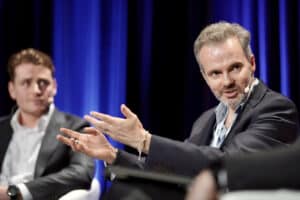Panellists took a look at how best to leverage predictive analytics, ultimately agreeing that though technology can go a long way – the human traders must remain in the driving seat. During the TradeTech FX Europe panel, the ever-present build versus buy topic arose. Rick Lodder, algorithmic execution specialist at MN Investments, explained how the firm had opted to develop its own algorithms and the key benefits of this build approach.
During the TradeTech FX Europe panel, the ever-present build versus buy topic arose. Rick Lodder, algorithmic execution specialist at MN Investments, explained how the firm had opted to develop its own algorithms and the key benefits of this build approach.
“We were using a lot of the banks’ algorithms and we had to pay fees for them and we thought we’ve got the capabilities and smart people why not do it ourselves. We now have that platform [and] we’re retrieving loads of data points and storing them in databases and this allows us to do TCA by ourselves as well instead of solely relying on best ex or another third party for data […] It’s a simple cost equation.”
He added that the firm does not solely use its own TCA and banks are still employed and compared in order to get recommendations and develop continually.
John Stead, head of presales at smartTrade Technologies highlighted that the discussion is hinged on context: “If we’re talking to global banks, Tier 2 banks, regional banks, small buy side, etc. What is build and buy is going to change for small providers, they’re going to want to buy a lot and obviously other people want to build themselves.”
He went on to express the importance of modular solutions, stressing that pain points are different one entity to another. For the sell-side specifically, Stead highlighted that pricing and distribution is something they many may want to do themselves, whereas on the buy-side it could be more about connectivity.
Delving into how far automation could go, the panel were asked whether analytics could eventually make decisions as to how to execute, as opposed to merely facilitating human decisions.
Lodder stated that he did not see this eventuality for the time being, instead suggesting that technology would remain a facilitator, as opposed to an agenda-setter.
“Making decisions on when to trade it is possible to for chatGPT to provide you with a lot of good analysis but I still think that a trader has to be involved for making good decisions […] having good traders is still very important for a company to have, so solely relying on ChatGPT or AI, maybe in like 10 or 15 years yes, but in the near future, no.
“[…] In the long term who knows I think that the role of the trader will definitely change, like the traditional traders just pressing buttons and using algos that’s definitely going to change.
“The trader needs to adapt to be able to do all the analysing themselves, be able to code their own algos is going to change in the next couple of years and the traditional role of the trader is going to be extinct maybe.”
Stead added that from his perspective creating a feedback loop was an important factor, where analytics can suggest what market impact may be and adjust parameters to analyse potential outcomes. In terms of going one step further and electronifying the decision to execute, he explained that technology could go as far as recommending decisions, though agreed with Lodder that getting rid of traders was not on the cards for the time being.
“It can give you another level of protection I would say because it can say historically doing this kind of trade produced a large market impact, are you sure you want to do that, so that’s in effect what we’re doing here is simply querying the analytics within your trade parameters.
“[…] it’s not getting rid of the trader, but it’s augmenting their abilities. It’s giving them more safety behind the scenes, so not necessarily replacing a trader.”
Another aspect to this, panellists suggested, was that having a platform involved in trades and a tangible link between empirical evidence, and the choice ultimately made, would make justifying decisions to regulators easier. The checks and balances are an increasingly important aspect of trading and could serve as an additional motivation to embracing technology.
“Even the best trader in the world cannot recognise all these patterns in the market,” said Stead who reiterated that doing things ‘with evidence’ is valuable.
Stead asserted: “I would say you’re always going to need someone to control this. Trust with verification […] there’s a role for a trader here to oversee things.”